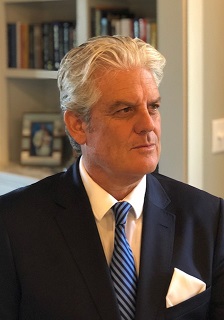From the CEO – April 2021

Dear Clients,
At PRS – and especially so in the ICRG – we are constantly looking at geopolitical risk from a range of perspectives, quantifying the impact of key events, and delineating emerging trends.
Our methodology compels us to appreciate and to convey to our clients how our risk metrics work in tandem. To this extent, geopolitical risk is not one-dimensional or driven by a single source. Rather, it’s fluid, ever-changing and – similar to Platonisms’ engagement with mathematics (geometry in particular) – it’s best to conceptualize political risk through the abstract medium of number and measurement. Or to use an example, to occupy Pythagorean notions of ratio and harmonic relations as underlying seemingly episodic events.
On this score, one of the key chapters in our new book, Quid Periculum, deals with how determinants of political risk affect stock market performance in developed, emerging and frontier markets.
The study, conducted by a research team from Finland, found that political risk is priced in all three stock market categories, but the effect of individual components of the ICRG score varies. For example, Government Stability affects all stock markets, but Ethnic Tensions and Law and Order shape equity returns only in emerging and frontier markets. Going further, Government Stability shapes frontier market returns, whereas Corruption, Investment Profile and Military in Politics are particularly determinative in stock market performance in emerging markets.
There are additional findings that are useful for our institutional investor clients but the notion of proportion – the idea that shaped so much of Italian Renaissance art – applies equally to political risk.
Turning to our ratings for the month, a number of regional developments stand out. In the Americas, Guillermo Lasso won Ecuador’s presidency but his pro-business approach might be weakened given that 70% of Congress are comprised of left-leaning parties. In Peru, Pedro Castillo leads going into June runoff with a 20-point advantage over Keiko Fujimori. Castillo has talked about fundamentally reforming the Peruvian political and economic system, which includes some rather worrisome suggestions of greater state involvement in commercial affairs. Yet Castillo is known for his pragmatism and will have to moderate his rhetoric if he wishes to prevail.
In Europe, public support for Italy’s prime minister, Mario Draghi, remains high, but his $299bn post-pandemic recovery plan will be key to the country’s longer-term stability and investor confidence. Meanwhile, Bulgaria’s election produced a fragmented parliament – suggesting fresh elections might be in the offing – while C19 cases/mobility restrictions are easing. The jobless rate sits at just over 5%.
In Russia, President Vladimir Putin looks to concentrate power further, as protests and arrests of demonstrators mount in support of opposition leader Alexei Navalny. The dissent comes at a pivotal time as parliamentary elections are set for September. At the same time, external relations have deteriorated given that Moscow has amassed some 100,000 troops along the Ukraine border. Watch the Donbas region for the beginning of any Russian incursions.
Over in Asia, C’19/variant cases are soaring in India as the government buckles down in an effort to mitigate the crisis and preserve its political legitimacy. Concurrently, Myanmar borders on the status of a ‘failed state’ as the protests against the military coup continue and armed groups have taken up territory once occupied by the army. Few public services are available and a run on the banks is expected once the sector reopens. Russia looks to play a role in the country’s internal affairs.
In Africa, Eritrean troops are participating in the violence in Tigray, and overall political stability remains precarious in Niger as an attempted coup occurred just days before the new president was sworn in. The putsch came from within Niger’s military, driven by those elements located in the Western section of the country that remain opposed to the new regime.
And to the Middle East, all eyes are on Algeria’s election tentatively set for June 12. Look for voter turnout levels as a sign of public confidence and whether some of the proposed reforms of the current regime will carry forward after the tally.
April was another productive month for new and returning clients, ranging from some of the world’s top universities to the largest institutional investors throughout the US, Europe, the UK, and the Middle East and Asia.
We are pleased to be working with the Finance Ministry of the Government of Uzbekistan in an effort to bring that country into the ICRG fold and have it ranked alongside the 140 countries contained in the index.
I enjoyed speaking in April at Kazakhstan’s International Business Integrity Forum. Intended to discuss developing a favorable business environment and ensuring the protection of the rights and interests of entrepreneurs and investors in the country, I was joined by an excellent line-up of speakers including Christopher Campbell-Holt of the AIFC Court and IAC, Jean-Francois Marteau of the World Bank and number of Ambassadors from Jordan, South Korea and the Netherlands.
Not only is ICRG being used by some of the world’s largest technology firms, but the data are now being incorporated increasingly into the artificial intelligence/machine learning space, with an emphasis on ESG data! On this score, we are especially pleased that our data are being used by an increasing number of institutional investors as the empirical connection between our select risk indicators and various asset classes become more pronounced and tradable. For decades, PRS’ reach has been global, offering the absolute best quant-driven and independently back-tested data available anywhere.
We are also delighted to mention that PRS will be completing its re-branding process this year which will include a new look that pays homage to our 40+ year history, along with various events that helped lay the foundation for our work – some of which extend to the introduction of the Hindu Arabic number system in the Renaissance period and a now famous exchange of letters between Blaise Pascal and Pierre de Fermat in 1654. As part of the new-look PRS, we will continue to unveil new products which include data bundles of particular importance to the academic world and more timely country risk forecasts available online.
We continue our discussions with the data analytics departments from several of our academic clients in the US, with the aim of providing the most comprehensive, AI-generated and back-tested data on geopolitical risk available anywhere. The effort pairs our internal work under the rubric of the PRS Artificial Intelligence Initiative, which we will soon make available to select clients. Stay tuned for more details.
Our ICRG political risk scoring changes were very robust in April, affecting some 78 countries (of 140) and over 100 individual political risk metrics!!
Thanks for your continued support, and please contact us if we can be of any assistance.

Chief Executive

PRS INSIGHTS
Moving beyond current opinions, a seasoned look into the most pressing issues affecting geopolitical risk today.
EXPLORE INSIGHTS SUBSCRIBE TO INSIGHTS
